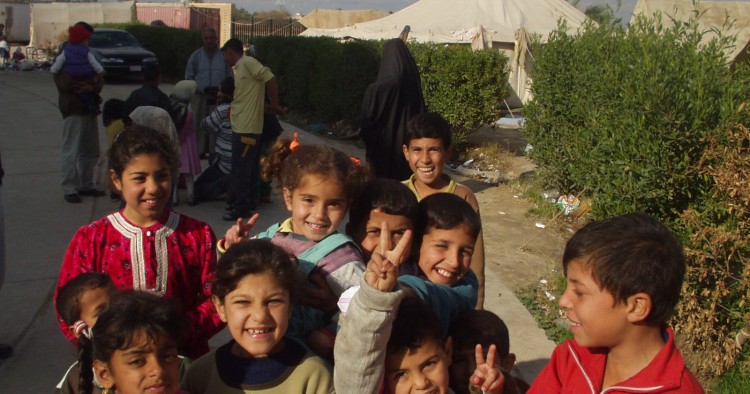Originally posted July 2008
Nur, an Iraqi refugee who has been in the States for four days, is dipping parsley in a china cup of salt water in Bethesda, Maryland. The salt water signifies tears shed over slavery and displacement; the parsley stands for spring and hope. Another interpretation likens the act in the Passover Seder to a biblical moment of betrayal: Joseph’s brothers sold him into slavery and dipped his striped garment in blood to feign his death.
In the hubbub of a Seder attended by one rabbi, two ministers, one former professional figure skater, two writers, one lawyer, and one lapsed Catholic, I murmur to Nur: It is both at once, damua‘ (tears) and rabea‘ (spring).
A week prior, a minister friend of mine, Louise, told me that her church would be helping a newly-resettled Iraqi refugee acclimate to the city. Louise did not know if Nur, the woman in question, would speak much English. Startled that the International Rescue Commission (IRC), had not anticipated this challenge and found a translator, I offered to accompany Louise to the airport and serve that role...
Nur arrived in a leather jacket, carrying a haggard elegance and a jittery self-restraint in her eyes. When I spoke to her in Arabic, relief flashed across her face; she asked please for a cup of Nescafe black — “no milk and no sugar since what had happened to me in Iraq” — and to sit down. In the empty 10 pm terminal, Nur told her story, slowing her Baghdadi Arabic into a fastidious Modern Standard Arabic, with some Egyptian dialect for intimacy.
Nur grew up in a wealthy, Sunni family in a 3-storied corner house with a garden and a pet parrot in Baghdad. She got a Masters in Interior Design and traveled to Europe. “We were a cultured family. We had friends from the whole city, Christian, Muslim, and Jewish. We felt safe under Saddam.” After the US invasion of Iraq, Nur’s former life became unrecognizable: “Because it was a strategic location, US troops took over my home. We had to leave our house.” Perhaps 2004 was the first year of the war that sectarianism made dark and irreversible fissures in the country; the ‘Ashura massacre of March attributed to al-Qa‘ida, which killed nearly 200 and injured some 500 Shia Muslims, signaled a turn in the war. In 2004, four men — three Iraqi Shia and one Iranian — kidnapped Nur for eight days. She was repeatedly raped and singed with cigarette butts. Nur fled to ‘Amman to live with family friends.
I asked Nur why she had chosen to come to the US. She replied, “I thought Dr. Phil could help me.” Nur felt that the TV pop psychologist, who doles out advice on everything from weight loss to teenage rebellion to marital rape, might be able to offer her a strategy on how to move forward. In the past several months, Nur has stumbled forward and backward, hindered by a far from perfect system in a country unaccustomed to integrating Iraqi refugees, as well as by her own unrealistic expectations and demands. The IRC, after some slow bumbling, provided temporary housing, visits to a doctor to help Nur alleviate her back pain, and a therapist affiliated with Torture Abolition and Survivors Support Coalition International (TASSC) who spoke Arabic. Nur was terrified to leave her room, was afraid of police sirens, and did not feel the IRC was helping her with the daily tasks of starting a life anew. Nur decided that she did not want to stay in Washington. She wanted to move to Boston, where another Iraqi refugee she knew in ‘Amman had been resettled in the same period. After some shuffling of paperwork by the IRC and a near purchase of a plane ticket to Boston, Nur decided she would prefer to live in Salt Lake City, to be near another Iraqi she knew. This too fell through and Nur decided that perhaps Delaware was the best solution, as she knew an Iraqi family there as well. At this juncture, with frustration accumulating on both sides, Nur and her case-worker — herself an Iraqi refugee resettled only nine months prior — had a falling out. Nur was increasingly fragile and increasingly demanding; the local IRC staff was a bit exasperated and not fully competent.
Nur found her own living accommodations, through connections of friends in ‘Amman. An educated Shia Iraqi family, a couple with a young daughter, could take Nur in for $500 a month. Last week, I visited Nur in her new accommodations. She is sleeping on a little bed in the master bedroom, along with the couple and their child. The small living room has a velour-draped couch, a little TV, and Nur’s English textbook. She brings me a dish of salted nuts and a coffee (with milk and one sugar).
The Middle East Institute (MEI) is an independent, non-partisan, non-for-profit, educational organization. It does not engage in advocacy and its scholars’ opinions are their own. MEI welcomes financial donations, but retains sole editorial control over its work and its publications reflect only the authors’ views. For a listing of MEI donors, please click here.













